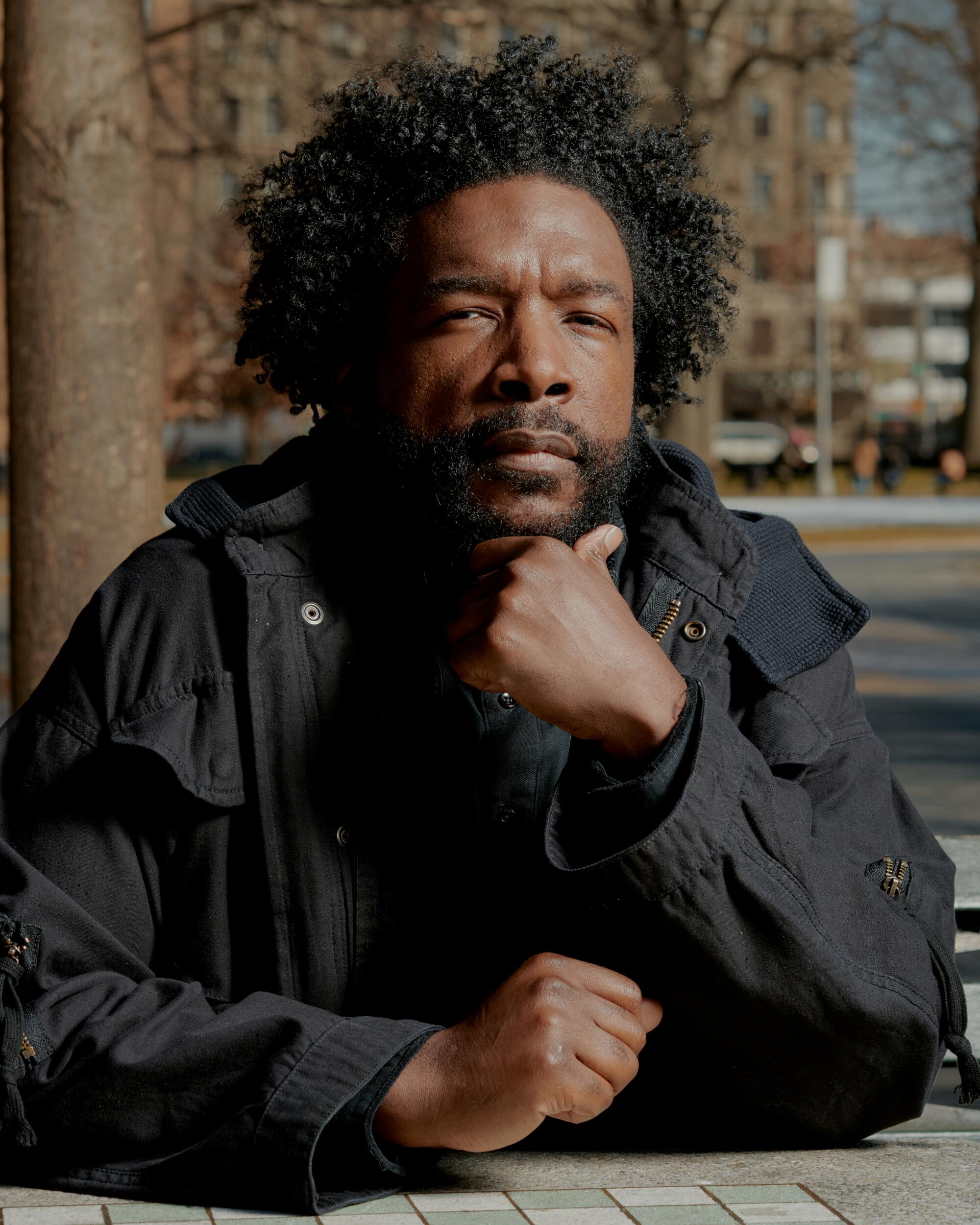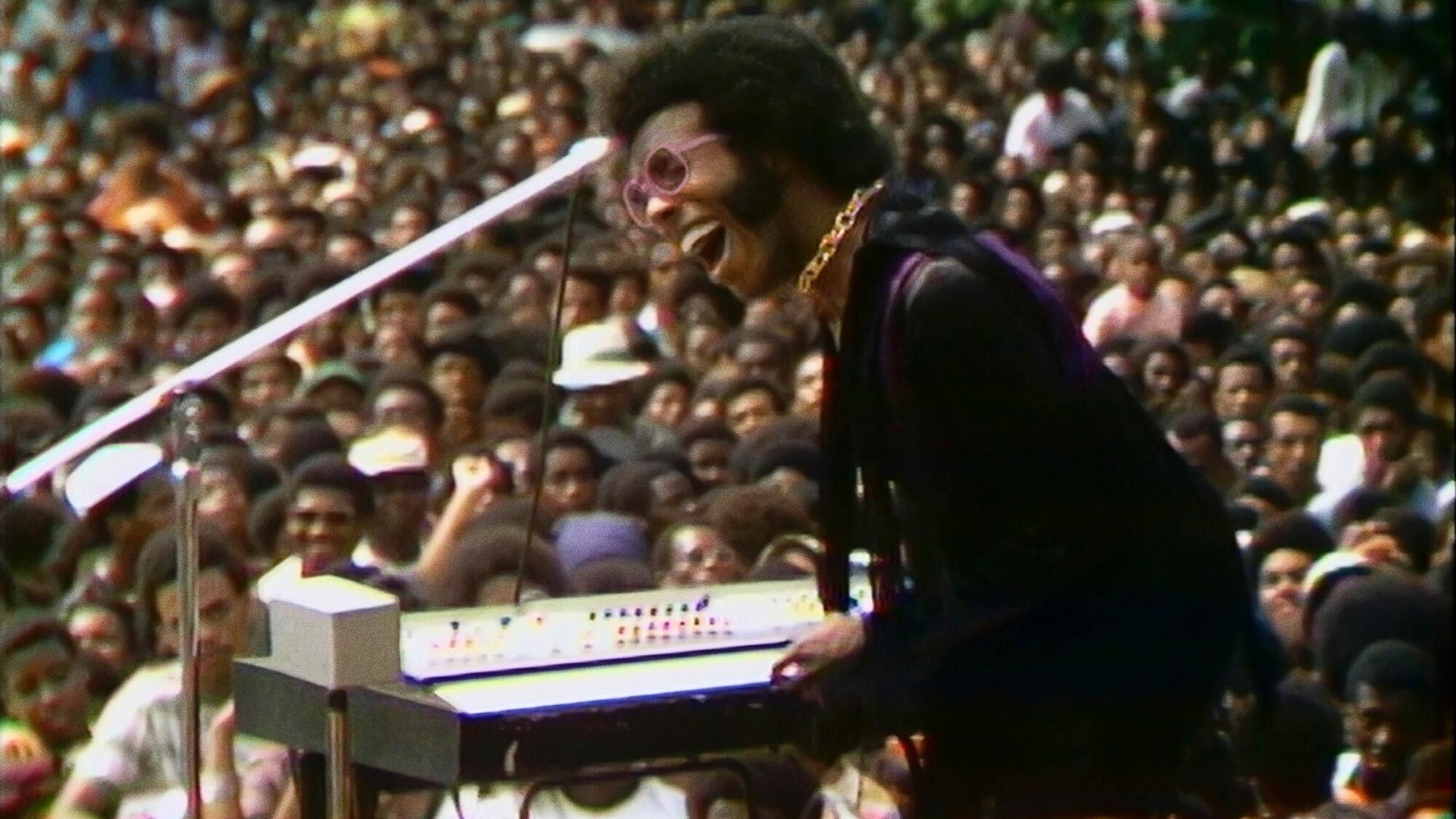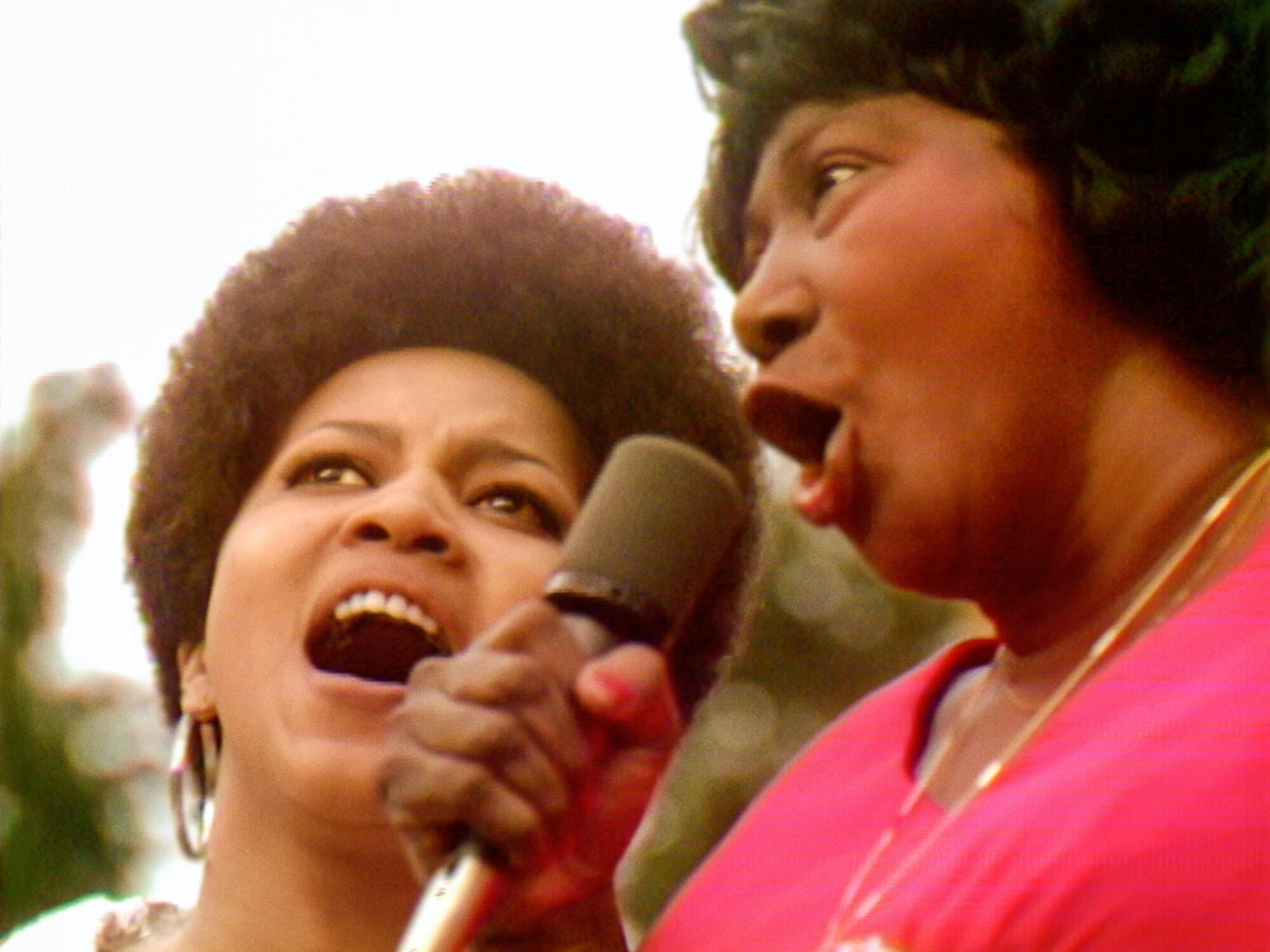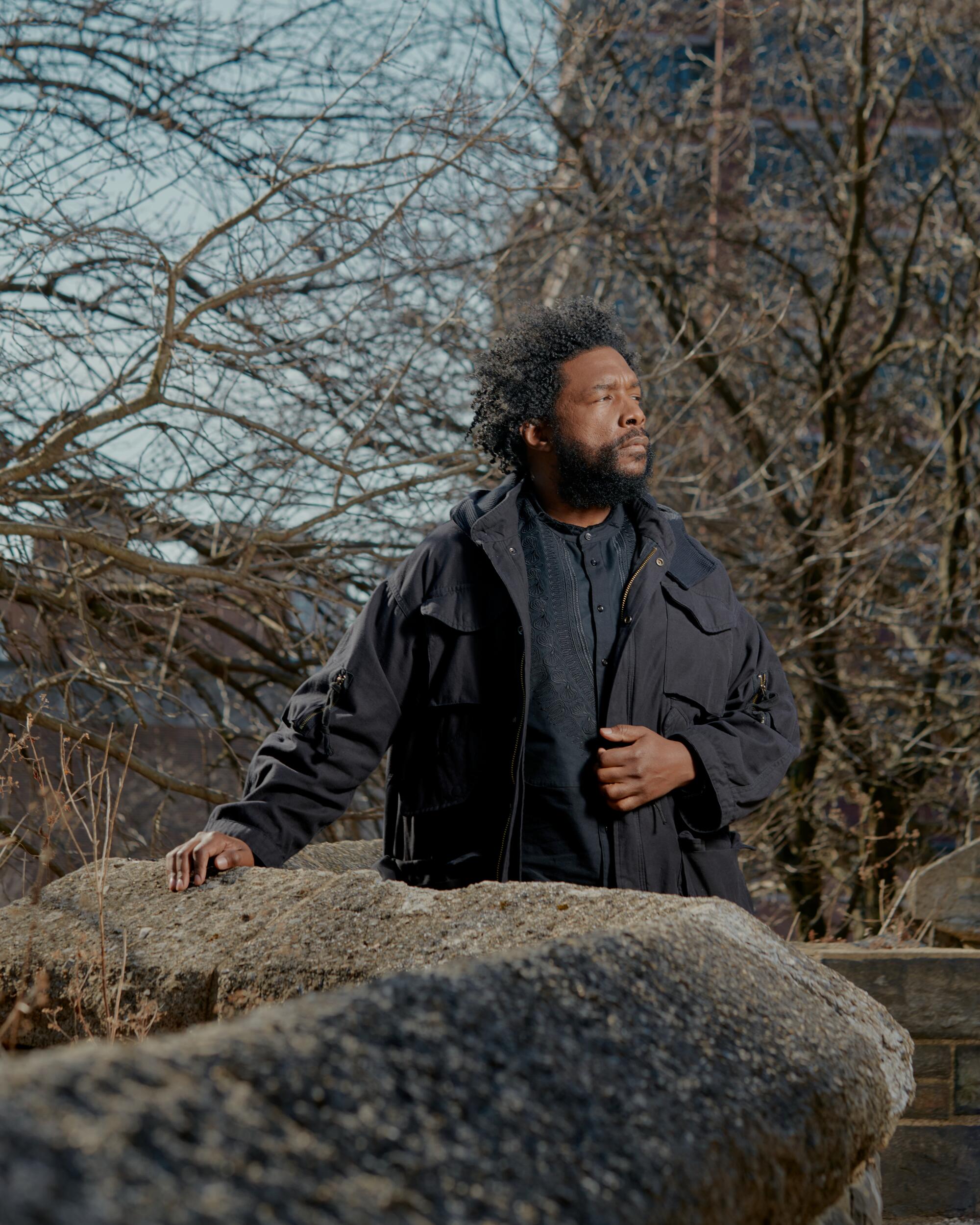- Share via

The first time producers pitched Ahmir “Questlove” Thompson on making a documentary about the 1969 Harlem Cultural Festival, the drummer-bandleader-producer-composer-DJ-podcaster-author-teacher was not impressed. “This ‘Black Woodstock’ thing existed almost on a level of the Great Pumpkin or Santa Claus or something,” says Thompson. “Nobody believed it actually happened, so when they came by just to talk about it, I was skeptical. When the meeting was over, I thought, ‘I’m never seeing them again.’”
But producers Robert Fyvolent and David Dinerstein made another appointment, and this time, they brought a hard drive compiling 40 hours of rarely seen footage featuring Stevie Wonder, Nina Simone, Sly & the Family Stone, Gladys Knight & the Pips, Mahalia Jackson, the Staple Singers, B.B. King, the 5th Dimension, jazz drummer Max Roach and other masters of American music.
“When they showed me the ‘Precious Lord’ segment with Mahalia Jackson and Mavis Staples, that’s when it really got serious,” Thompson recalls. “Still, I’m like, ‘Something’s got to be wrong.’ I didn’t trust the universe that something so awesome was waiting for me on a blind date to change the world.”
The project’s awesomeness became evident to audiences last year with the release of Thompson’s directorial debut, “Summer of Soul (… Or, When the Revolution Could Not Be Televised).” Now, the film’s been nominated for a documentary feature Oscar.
Thompson, speaking from his office at 30 Rock, where he leads the “Tonight Show Starring Jimmy Fallon” house band the Roots, says he spent months immersed in the trove of material captured by the late filmmaker Hal Tulchin. “I had a hard drive at home that beamed out to all my televisions in the house 24 hours a day, not to mention my studio here at 30 Rock, and on my phone. For five months straight, I kept all 40 hours of that festival on constant loop everywhere I went. Whenever I saw something that gave me goose bumps, I wrote it down. When we had 30 of those moments, that’s when I felt like we had the beginnings of a movie.”

Thompson’s first cut ran three hours and 25 minutes. A lengthy back-and-forth with producers and editor Joshua Pearson ultimately yielded 35 fat-free minutes of performance footage. “It’s a painful thing when you have to let your children go,” says Thompson. One darling the drummer simply couldn’t kill was Sly & the Family Stone’s raise-the-rafters performance of “Sing a Simple Song.”
“The producers said, ‘You’ve already got two Sly songs, “Everyday People” and “Higher.”‘” But I come from the hip-hop generation, and the breakbeat in ‘Sing a Simple Song’ is one of the cornerstones of hip-hop. I said, ‘If this movie comes out and I don’t include that breakbeat, all my friends are gonna stone me with popcorn in the movie theater.’”
Thompson parlayed his instincts as a DJ — he owns about 200,000 records — to sequence the music for maximum impact. “I have a sort of synesthesia or feng shui level to how I hear music,” he says. “That’s my gift: how to put these things in order.” Thompson nearly always begins at the end, he says. “Nine times out of 10, it’s about, ‘How do you want your audience to feel in the last 10 minutes of the project?’”

When Thompson took on the project in 2017, he envisioned the passing of the torch-like microphone from Mahalia Jackson to Mavis Staples as his gospel-powered finale. “That would have been the perfect Hollywood ending, had we done this film in 2011,” he observes. “It’s the perfect ‘Kumbaya,’ ‘Can’t we all just get along?’ moment.”
But working on edits in the spring and summer of 2020, Thompson had a change of heart and picked the incendiary singer-songwriter-pianist Nina Simone as his closer.
“Being smack dab in the middle of 2020, panicking about the pandemic, the world being shut down, George Floyd happened, Breonna Taylor happened, the city’s on fire, there’s shootings [of the] unarmed, there’s this weekly toll of death, death, death. And then when you look at where we were as a country in 1969, with the heavy amount of death we were dealing with, the assassinations, the Kennedy brothers, Malcolm, Martin — I really connected with this tall task of being creative in a time of stress, working on a film about creatives who got together in a time of stress. Nina Simone’s segment felt very 2020. She’s not doing show tunes and jazz anymore. This is a politically charged, angrier, fiery Nina Simone. Once we made that switch, it felt like a whole new movie.”
Interviews with more than 30 activists, musicians, audience members and critics provided valuable context in between the music segments.

“Given everything going on that summer,” Thompson says, “I felt we had some explaining to do.” His star witness arrived in the person of festival attendee Musa Jackson. Just 5 when he saw the 5th Dimension take the stage at Mount Morris Park, Jackson raised eyebrows the minute he walked in the film production room. “I look over at my producer Joseph Patel: ‘Man, there ain’t no way this guy is much older than me, and I’m two years younger than the festival,’” Thompson recalls.
“But we ask him what he remembers, and Musa tells us about seeing the 5th Dimension, and he described their outfits. We’re like ‘Damn, how do you know that?’ and Musa says, ‘This is my first memory in life.’ I swear to God I was not trying to do that emotional exploitation interview thing, but when we showed him the concert footage and Musa started crying, we realized, ‘This is not going to be just a music film. This is gonna be emotional.’”
More to Read
From the Oscars to the Emmys.
Get the Envelope newsletter for exclusive awards season coverage, behind-the-scenes stories from the Envelope podcast and columnist Glenn Whipp’s must-read analysis.
You may occasionally receive promotional content from the Los Angeles Times.








